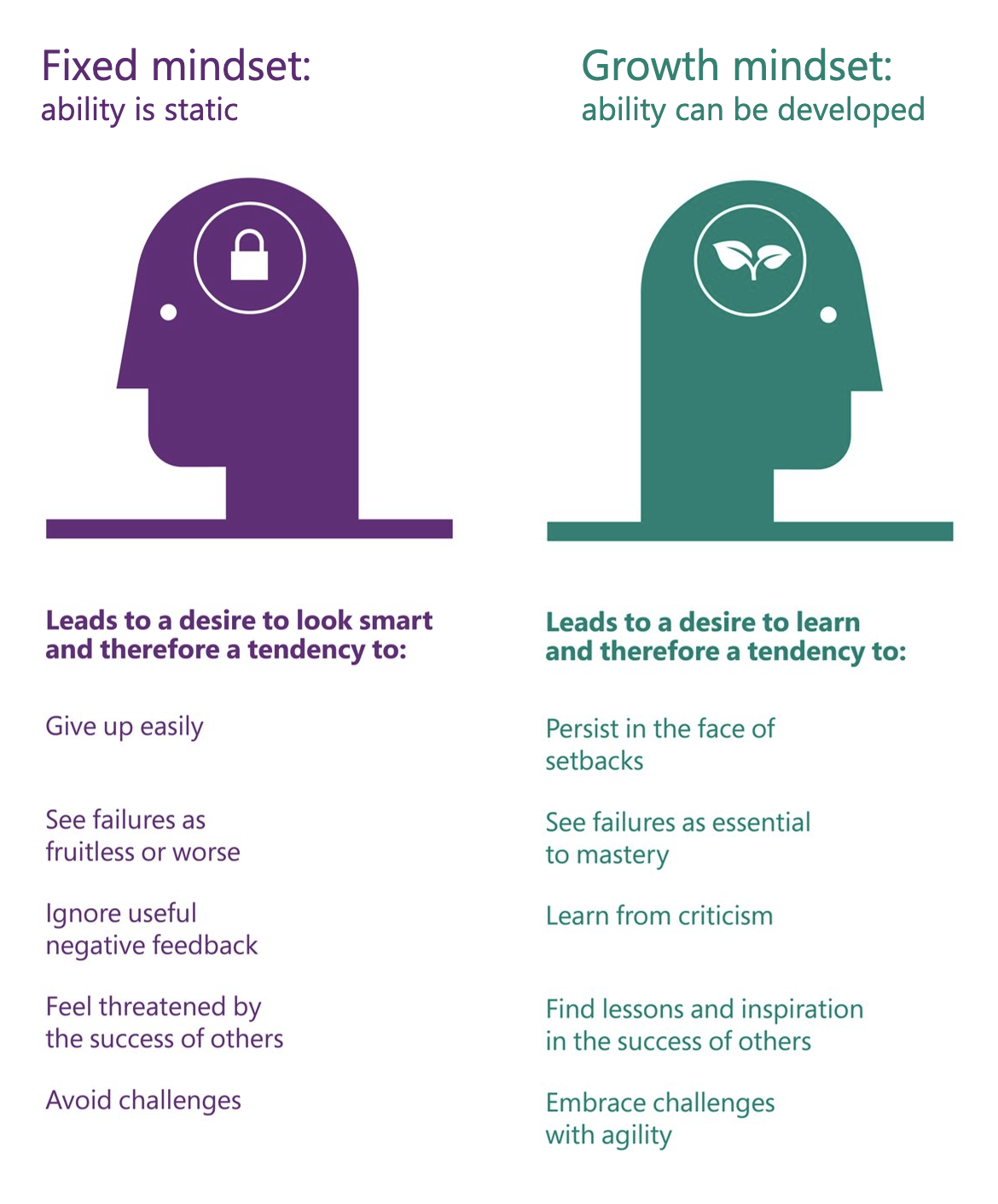Cultivate a growth mindset
An important part of ensuring success with your OKR program is cultivating a culture of growth mindset, where employees feel safe to try, learn, and improve.

OKRs and Viva Goals help facilitate a culture of growth mindset by making organization, department, and team-wide goals clear to every employee.
As an OKR Champion, it’s important that you frame the OKR and Viva Goals rollout as a collaborative opportunity to align, focus, and learn together as an organization. This will help secure the buy-in and adoption you need to be successful with OKRs organization-wide.
Start with psychological safety
At work, psychological safety refers to an employee's sense that they can speak up about their ideas, make mistakes and ask questions without fear of negative consequences that could harm their career or their personal well-being.
When people feel safe at work, they're more likely to take informed, intentional risks and approach scenarios from a different angle, driving towards an innovative, productive culture.
Change feels less threatening when people know there's time and space to grow. This allows them to be open and curious about change rather than fearful and resistant. As curiosity and fear can't coexist in the brain, psychological safety is a crucial component for cultivating a growth mindset. Setting ambitious goals and learning from the results are the metrics for success within the OKR framework.
There are two significant ways OKR Champions can help create psychological safety:
- Normalize intelligent failure
- Celebrate small wins
Normalize intelligent failure
Normalizing "intelligent failure" is a great first step toward cultivating psychological safety. Intelligent failure is failure that arises from thoughtful experiments or smart risks. This gives people the freedom to experiment and encourages them to set ambitious goals without fear of negative repercussions. As setting stretch goals are crucial to the long-term success of the OKR program, OKR Champions should work to create a work culture that normalizes intelligent failure.
One way to normalize intelligent failure is to ask questions at the end of the OKR cycle like, "What did we learn?" "What can we change next time?" or "What could have gone better?" This reflection time allows teams to contextualize their scores and constructively brainstorm about what they could change for the next OKR cycle. This shifts the focus from performance to growth.
Normalizing intelligent failure is also built into OKRs with scoring; scoring a 100% isn't considered successful because it means the goal wasn't ambitious enough. OKR Champions should help their teams redefine success and aim to score between 70% and 90%.
Celebrate wins
Another way to promote a sense of safety is by celebrating wins along the way, big or small. Acknowledging work done along the way gives people a sense of accomplishment and communicates that they are on the right track. It also creates a more positive atmosphere and a work culture where employees trust they'll be recognized and appreciated for their efforts.
Celebrating small wins can be done individually but should also have a public component. This allows people to be recognized and celebrated by their colleagues.
Creating a communication channel dedicated to individual and team recognition and encouraging everyone to participate in it is a great way to cultivate this practice. OKR Champions can also request five minutes in monthly town hall meetings to celebrate their teams' success. This keeps OKR progress top of mind while strengthening trust and collaboration between teammates.
For more information on how to build a culture of communication and community around OKRs, visit our OKR Community Toolkit.
Cultivating psychological safety at work increases mental and emotional bandwidth and helps employees feel supported at work. This proves especially helpful when introducing new work patterns and expectations as it increases people's resiliency when they have trouble with this change.
Psychological safety also helps people stay in a growth mindset because they feel freer to take risks and explore. Psychological safety and cultivating a culture of growth mindset is essential for ensuring the long-term success of an OKR program.